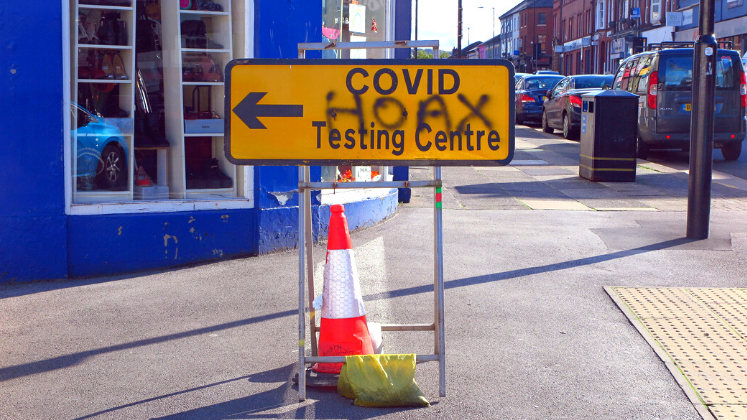In the aftermath of COVID-19, the Falkland Islands Government has taken concrete steps to tackle long-standing inequalities, prompted by evidence of the impact of COVID-19 restrictions on local communities. How was the evidence-policy gap bridged in this instance? Flora Cornish and Kate Cochrane reflect on relational policy-making in small countries.
In early 2020, as governments around the world rushed to implement restrictions on movement to stem the transmission of COVID-19, in the Falkland Islands, a group of emergency management and healthcare practitioners, policymakers and researchers simultaneously began to plan for the Islands’ recovery. We were part of that group. One of us, Kate Cochrane, was employed as a lead Emergency Planning Manager with the Falkland Islands Government. The other, Flora Cornish, contributed research expertise on community recovery and methodology. The Falkland Islands Government established a Community Recovery Working Group, which initiated a series of Community Impact Assessments.
We could not have predicted at the outset the systemic changes that would result, but 2 years later, significant legislative and policy changes were underway. With years of experience of the ‘evidence-policy gap’ and the rarity of political will post-disaster to challenge past practices, we were positively surprised by the results. What changes were produced and how did they come about?
A relational approach
We take a relational approach to the challenge of knowledge mobilisation. This contrasts with the linear, rationalist model of evidence use, exemplified by the medical research catchphrase “bench to bedside”. A relational approach puts interactions among researchers, policy-makers, and policy-implementers at the centre. It calls for mutual exchange, rather than one-way transmission, and early and ongoing collaboration. It does not assume that evidence comes first, and policy later, but that policy environments and evidence generation develop in tandem, through mutual influence.
A relational approach puts interactions among researchers, policy-makers, and policy-implementers at the centre.
In our work in the Falkland Islands, this relational approach meant engaging diverse stakeholders with relevant expertise, power and legitimacy to effect change. A strategic Recovery Co-Ordination Group, whose membership comprised leaders with legitimacy and decision-making power, was led by the Government’s Chief Executive. A tactical-level Recovery Working Group included specialists from Social Services, Communications, Mental Health, and subject matter experts, and was led by a widely respected senior government officer. Because of the small size and close-knit nature of the Falkland Islands, these senior and specialist experts are not distant from local experience. Early conversations in these groups surfaced anecdotal experiences of how the crisis exacerbated pre-Covid-19 vulnerabilities and inequalities. Members agreed that an inclusive process was crucial, and agreed to a series of wide-ranging Community Impact Assessments, designed to listen to less heard voices. The groups prepared themselves to face uncomfortable lessons about vulnerabilities and inequalities in the Islands.
Unequal impacts in a diverse community
The Community Impact Assessments used online and paper surveys, small-group workshops, and one-to-one meetings, to explore residents’ experiences of the Covid-19 disruption and the government response. Online surveys had been the traditional method for Falkland Islands Government consultations. Comparison of the survey demographics with census data revealed that racial minorities and those with less secure immigration status were under-represented – and thus these groups were specifically targeted with the other methods.
As a result of the inclusive research design, vulnerabilities and inequalities that had not been previously recognised were made visible. Workers who had routinely relied on overtime payments to make ends meet saw their incomes severely reduced when furlough payments did not cover overtime earnings, revealing their long-standing income insecurity. The insufficiency of the basic state pension was made evident when low-income pensioners had to stay home and order groceries remotely. They described how they usually scraped by financially, relying on in-store discounts and special offers to make their weekly budget cover their needs.
Some people saw their rents increase to unaffordable levels, inflated by government demand for rental properties for quarantine purposes, raising the issue of long running housing insecurity. Limits on access to passport, identity document and visa services added major disruption and distress to migrant workers and those with insecure immigration status. And questions of social cohesion were raised, as members of all social groups said that they felt their own group experienced particular hardships in comparison to others. This final point concentrated the Working Group’s attention to structural, long-standing inequalities among racial groups and along lines of immigration status.
Towards incremental systemic change
The first step towards systemic changes was that the inclusive methodology made visible experiences of marginalisation that had previously been hidden. Politicians found people’s stories of deprivation moving, expressed shame at the inequalities revealed, and committed to tackling them. The Government established an Equalities working group, agreed on the establishment of a Portfolio for Equalities with a named Member of the Legislative Assembly responsible, and set an initiative in motion to enact Equalities legislation, which had been mothballed since 1994.
The first step towards systemic changes was that the inclusive methodology made visible experiences of marginalisation that had previously been hidden.
Economic inequalities also generated policy change. Stimulated by the findings of the Community Impact Assessments, the Chief Economist’s annual report in April 2021 for the first time highlighted income inequality. In June 2021, to replace a disjointed and complicated benefits system, which was found to be inaccessible to some eligible households, a new ‘Single Income Supplement’ came into effect. In April 2022, the parliament supported a new initiative for the Chief Executive to consult those experiencing financial hardship in order to bring a policy paper by the end of 2022, with the MLA who proposed the motion citing the Covid Recovery work as having drawn attention to the issue .
However, some of the harshest inequalities resulted from residents’ differing citizenship status, which determines people’s access to benefits and services, their ability to plan for the longer term, and their inclusion as voters. This fundamental structural division is very resistant to change, maintained in part by the geopolitical stakes attached to Falkland Islands citizenship – with Argentina poised to take advantage of any loosening of citizenship criteria, to make territorial claims, and Great Britain tightly controlling potential access to UK citizenship. This fundamental source of inequality could not be tackled solely at the local level.
Why did relational policy-making work?
In the early days of COVID-19, hopeful commentators entreated governments to take the opportunity of the disruptions occasioned by the pandemic to break with past harmful policies and inequalities, as Arundhati Roy put it, to use the “pandemic as a portal” to a better future. Disappointment has often resulted, but we see, in the Falklands Islands case, steps towards what we call “incremental systemic change”. Why did this happen?
First, the inclusive nature of the working groups and the Community Impact Assessments secured wide and enthusiastic engagement, particularly from those people previously missed in consultations, thus demonstrating that people are not “hard to reach” but the methods we choose to use make them so. If the political will is there, it is possible to engage widely.
In the Falkland Islands, people talk about services being “one brick thick”, i.e. that the same person is both a policymaker or manager and the frontline policy implementer.
Second, the global Black Lives Matter protests against racial inequalities during 2020 sharpened the focus of elected and appointed members of government on racial inequalities. Those who were already championing equality gained traction. Combined with local, personal accounts of deprivation in the Falkland Islands, political will was created.
Third, the small size of the country allowed the relational approach to be productive. In the Falkland Islands, people talk about services being “one brick thick”, i.e. that the same person is both a policymaker or manager and the frontline policy implementer. There is a short distance between the community and decision-makers, and the ‘evidence-practice gap’ is a shorter gap to bridge. The limited bureaucracy and lack of long chains of decision-makers and implementers, means that a few determined people, with strong connections, can make meaningful policy changes on the basis of evidence.
This post draws on the authors’ article, Inclusive recovery planning for incremental systemic change: A methodology, early outcomes, and limitations, from the Falkland Islands’ Covid-19 recovery planning experience, published in the Journal of Contingences and Crisis Management.
The content generated on this blog is for information purposes only. This Article gives the views and opinions of the authors and does not reflect the views and opinions of the Impact of Social Science blog (the blog), nor of the London School of Economics and Political Science. Please review our comments policy if you have any concerns on posting a comment below.
Image Credit: Adapted from Littlehampton Bricks via Pexels.









1 Comments